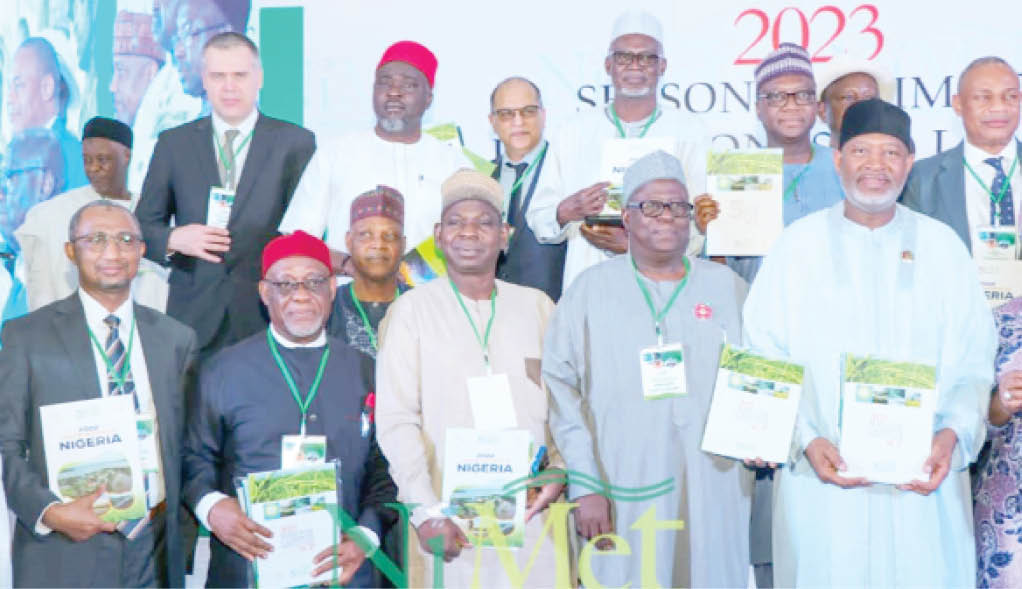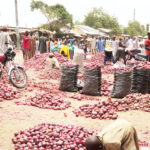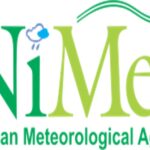As part of its annual activities, the Nigerian Meteorological Agency (NiMet) on January 25 released its 2023 Seasonal Climate Prediction (SCP), which gives a general climatic and weather forecast advisory during the year and the potential impacts on diverse sectors of the economy.
The SCP does not replace the daily and five-day weather forecast by NiMet throughout the year.
The NiMet SCP has become a critical component of planning by the government Ministries, Departments and Agencies (MDAs). It also impacts other aspects of our national lives like prospective diseases outbreaks, the transport modes as well as how the farmers grow crops and keep animals.
This year’s SCP is likely to draw the attention of key stakeholders following the devastating floods witnessed in many parts of the country in 2022.
- How 11 passengers burnt to death in Ondo auto crash
- NIGERIA DAILY: Nigerians Express Mixed Feelings On Extension Of Deadline For Collection Of Old Naira Notes
The 2022 floods led to the death of over 600 people and displaced over 2.4 million. It also affected investments in agriculture, transport infrastructure, houses, power lines worth millions of dollars,” Sen. Hadi Sirika, the Minister of Aviation said at the launch of the SCP.
In 2023, although the NiMet forecast has predicted a largely normal rainfall pattern, it also indicated a high possibility of flash floods in some states. NiMet Director-General, Prof. Mansur Matazu said there was likely to be elevated dry spell in some states of the north with potential adverse impact on planted crops.
Rainfall patterns
According to the 2023 SCP, the rainfall onset date is predicted to be earlier than the long-term average in most parts of the country. However, parts of Katsina, Zamfara, Kano, Jigawa, and Yobe in the north and Cross River, Ebonyi, Imo and Rivers in the south are likely to experience delayed onset. The onset dates for parts of Adamawa, Bauchi, Gombe, Kwara, Oyo, Ogun and Lagos are likely to be near their long-term averages. Onset is expected to start from the coastal states of Bayelsa, Rivers and Akwa Ibom states in early March and around June/July in the northern states such as Sokoto, Kebi, Zamfara, Kano, Katsina, Jigawa, Yobe and Borno.
NiMet also predicted an early End of Season (EoS) over parts of the south comprising Osun, Ondo, Edo, Delta, Imo, Bayelsa, Rivers, Akwa Ibom, Ogun and Lagos states. Parts of Yobe, Adamawa, Niger, Nasarawa, and Kogi states are also predicted to have early end of season when compared to long-term average conditions. However, an extended rainfall season is predicted over parts of Gombe, Kaduna, Kwara, Enugu, Anambra, western Ogun and Lagos State. The cessation is anticipated earliest in September over parts of Sokoto and Katsina states, while it would occur much later in December over most parts of the coastal region.
Similarly, the agency predicted average to above average amounts of rainfall in most parts of the country. The prediction shows that parts of Yobe, Jigawa, Kano, Bauchi, Jigawa, Kaduna states and the FCT are likely to observe below average annual rainfall. Nasarawa, Taraba, Kogi, Benue, Ekiti, Osun and Oyo State as well as the FCT, are expected to have 1190mm to 1590mm of rain while Bayelsa, Akwa-Ibom, Delta and Cross River State are predicted to record annual rainfall amounts of 2700 mm and above.
The length of growing season in most places in the country is likely to be near the long-term average, except for some parts of the northern states such as Katsina Jigawa and Kano where shorter than the long-term average length of the growing season is anticipated. Parts of Lagos, Ondo, Delta, Bayelsa, Rivers and Cross River are also likely to have a shorter length of growing season.
Temperatures pattern
According to the SCP, temperatures are expected to be generally above the long term average across the country. Both daytime and night temperatures are predicted to be warmer than the long term average over most parts of the country in January, March, and May. However, February day and night time temperatures are predicted to be cooler than the long-term average. Additionally, most of the north is also anticipated to be warm in March 2023.
In another prediction, a mild to moderate (8-16 days) dry spell is predicted to occur in April 2023 in the south after the onset is established. Furthermore, a severe dry spell, that is likely to last between 15 to 21 days or longer, is predicted in June to early July in Sokoto, Zamfara, Kebbi, Jigawa, Katsina, Yobe, Borno, Kano and some central states. A moderate dry spell is predicted over Niger, Nasarawa, Gombe, Bauchi, Benue, Kogi and the FCT. A mild dry spell is predicted over Ekiti, Edo, Ondo, Anambra, Ebonyi, Ogun and Imo states in July.
Impact on health, transportation, agriculture
NiMet predicts the probability of occurrence of malaria and meningitis across Nigeria and that determines the vigilance level. Parts of Taraba, Benue, Kogi, Kwara and Nasarawa states might have a malaria outbreak as early as January 2023, the report said.
NiMet further advised high vigilance for meningitis over the extreme northeast of the country, covering most of Borno, Yobe and parts of Jigawa states, as early as January 2023. As the year progresses, the area under high vigilance threshold extends southwards and reaches the maximum extent in March 2023. The area under high and moderate vigilance for meningitis reaches the southernmost extent, covering up to Benue, Kogi, Kwara and parts of Oyo states in January 2023.
The prediction for 2023 also shows that the onset of the growing season is likely to range from early to normal in most parts of the country. However, later than normal onset dates are expected over parts of northern Borno, Bauchi, Jigawa, Kano, Katsina, Zamfara and Yobe in the north as well as Abia, Imo, Rivers, Cross River, and Lagos states in the South of Nigeria. However, below normal rainfall amounts (420-720mm) is predicted in some places over the extreme North such as Borno, Yobe, Kebbi, Katsina, Sokoto and Jigawa and this is likely to create water stress in those areas. NiMet advises farmers around these areas to preserve soil moisture, ensure frequent weeds control, and encourage the increase of soil biodata that promotes soil health and crop performance, use of supplementary irrigation during dry spells, among other measures.
With the early onset and ample amount of rains expected and the experiences of the year 2022, it would be good to know that the water table has not gone too low and the aquifers are still very much active across the country and as such there could be chances of flash floods over many places largely due to poor sanitation practices. These floods could lead to the outbreak of diseases, fatalities and the destruction of properties.
Similarly, NiMet predicts that the heavy rains accompanied by strong winds will lead to more cases of flight disruption. It further indicated that aquaplaning could cause aircraft skidding off the runway. The projected high temperatures will increase the prospects of wind shear and air turbulence. The prospects of increased mid latitude wave activity will also increase the spate of raised dust and dust haze conditions, which can increase chances of flight delays and cancellations due to the attendant poor horizontal visibility. There will be more disruptions to flight operations because of more convective activities (wind shear, microburst, poor visibility due to heavy rain), the forecast warned.
The agency also predicted that the weather patterns imply increased weather hazards for boats and other vessels on the inland waterways. This includes, boats capsizing, drowning and other accidents. NIMet thus tasked NIWA and NIMASA to leverage its weather advisories to mitigate the disasters.
The National President, All Farmers Association of Nigeria (AFAN), Alhaji Farouk Rabiu Mudi said farmers now take NiMet’s prediction more seriously following what they experienced in 2022.
“We had devastating effects of floods in almost all the states of the federation. Most farmers lost their livelihoods. Prices of farm produce were impacted,” he said.
“This year, more farmers are interested in what NiMet will predict and advise. If we don’t take advice from NiMet, we are doomed. We are over 200 million people and everyone eats food. So weather information is critical to adequate food production to feed these people and for exports.”
The Director General of National Emergency Management Agency, Mustapha Habi Ahmed, said the negative impacts of the recurring flood disaster in Nigeria, could be more devastating without the early warning information developed out of the NIMET SCP and downscaled to the various end-user agencies and the general public.
“Hydro-meteorological information from NIMET has continued to play a vital role in disaster preparedness, response and mitigation plans of NEMA. The NiMet Seasonal Climate Prediction (SCP) has over the years become a veritable tool that enables NEMA to conduct expert analysis of disaster risk implications and produce disaster early warning messages for delivery to emergency responders to support the protection of lives, critical national assets and the entire cultural landscape in Nigeria.”

 Join Daily Trust WhatsApp Community For Quick Access To News and Happenings Around You.
Join Daily Trust WhatsApp Community For Quick Access To News and Happenings Around You.
